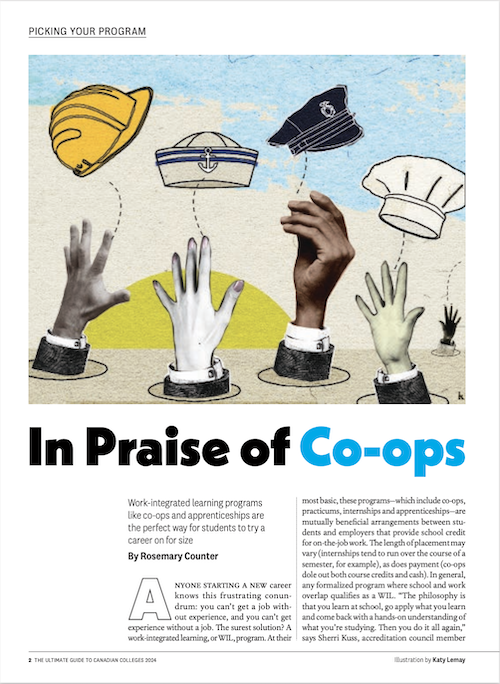In praise of co-ops
Co-ops and apprenticeships are the perfect way for students to try a career on for size
Anyone starting a new career knows this frustrating conundrum: you can’t get a job without experience, and you can’t get experience without a job. The surest solution? A work-integrated learning, or WIL, program. At their most basic, these programs—which include co-ops, practicums, internships and apprenticeships—are mutually beneficial arrangements between students and employers that provide school credit for on-the-job work. The length of placement may vary (internships tend to run over the course of a semester, for example), as does payment (co-ops dole out both course credits and cash).
In general, any formalized program where school and work overlap qualifies as a WIL. “The philosophy is that you learn at school, go apply what you learn and come back with a hands-on understanding of what you’re studying. Then you do it all again,” says Sherri Kuss, accreditation council member at Co-operative Education and Work-Integrated Learning (CEWIL) Canada, which helps create partnerships between schools and the community to facilitate WILs.
Most post-secondary schools in Canada offer some kind of co-op opportunity, and have full-time staff advisors to help students find and secure a perfect placement that works for both them and employers. CEWIL maintains a national database and says that some 100,000 Canadian post-secondary students participate annually in accredited co-op programs. Students earn, on average, almost $20 an hour in a variety of disciplines and industries.
At Mohawk College in Hamilton, Ontario, students complete about 3,000 co-op placements per year that range from four to 12 months. The school employs dedicated co-op specialists to facilitate matches, while co-op prep courses help students create resumés, perfect their interview skills and even review contracts.
As part of his three-year program at Mohawk, mature student Adam Longboat completed a co-op at the downtown Toronto office of Zurich-based insurance company Swiss Re. “The co-op provided me the chance to experience the insurance industry and start a second career,” he says. For his placement, he worked in re-insurance with a focus on natural catastrophes—but he contributed more to the company than that. Swiss Re recognized a valuable perspective in Longboat, who is Indigenous, and invited him to lead a series of events for Truth and Reconciliation Week. For his efforts, Longboat received an Ontario Co-op Student of the Year Award in 2022.
Businesses are eager to get co-op students on board. Depending on the industry (tech, for example), there are often more placements available than there are students to fill them. That was the experience for Cherry Joy Cael, who studied culinary arts at George Brown College in Toronto and left a career fair with offers of co-op placements at multiple restaurants. She ultimately chose Maligne Canyon Wilderness Kitchen in Jasper, Alberta, where she spent a sum- mer placement. “I took all the things we learned in class and got to actually try them out,” says Cael, 32, who graduated in June of 2022. “Plus, I got to travel.”
The educational benefits of co-ops are proven. “There’s evidence that shows students who do co-ops absorb skills better, learn faster and retain and apply knowledge more easily,” says Jennifer Figner, vice-president, academic, at the British Columbia Institute of Technology, where roughly 450 students complete some 600 co-op terms each year. Last year, a Spanish study on co-ops found they also encourage the development of interpersonal skills and improve class participation.
The perks of co-ops extend beyond students and employers to the schools themselves, which benefit when co-op students return to the classroom with hands-on industry info that helps ensure classroom materials are current and relevant. These placements also help students to learn more about their career goals and to choose courses accordingly. Colin O’Hagan, a 22-year-old business administration–marketing student at Conestoga College in southwestern Ontario, is currently midway through a social media marketing co-op. “I love my work with social media, but the placement made me realize what I really want is to start my own business some day, and help young business owners build their brand,” says O’Hagan. When that happens, he plans to hire a co-op student or two.
Co-ops also function like a months-long job interview that can ease the sometimes difficult transition into the workplace. “Before my co-op, I’d throw a lot of stuff together last minute,” says O’Hagan. “My co-op taught me to work even harder and manage my time.”
But it isn’t unusual for students like O’Hagan to try a placement or position and decide the fit isn’t quite right. In fact, that’s kind of the point of a co-op—it provides a taste of a particular work environment and helps students to figure out exactly what they want from a lifelong career.
